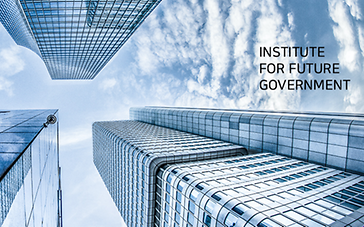- Institute for Future Government May 31, 2021
-
Thinking about a “Better World”
"The future means a time that hasn't yet come. The past can never return to the time that has already passed and can't be changed. The present is only a brief moment between the past and the future, and it is difficult to see that it actually exists because it becomes the past the moment you realize it is the present. After all, among the past, present, and future, the only object that humans can change is the future. So, those who are committed to making the world a better place should pay the most attention to the future. Also, from the perspective of phenomenology, the future can be said to be a reality in a time that hasn't yet arrived. The future is not just the flow of time, it is the reality, lifestyle, culture, and values of the people who will live in that period. Planning for the future doesn't mean that everything goes as planned, but constantly thinking about the future is a very important step in itself. It's because our future is changing even now, depending on the choices we make, our efforts, and our beliefs about the future."
- from The Future Government as an Innovation Case

(Photography by Philipp Bbirmes / www.pexel.com)
At Yonsei University in Seoul, South Korea, there is a research institute called the "Institute for Future Government," which considers alternatives for a better future. It is a research institution that has been expanded from a research group to a research center by connecting two small-stage research teams that started as the Social Science Korea (SSK) project of the National Research Foundation of Korea (NRF) in 2011. The project was operated under the research theme of "International Regime, National Capabilities and Changes in Government Functions" by integrating the "Government Rediscovery Team," which has been conducted by Professors M. Jae Moon and Yong Suk Jang of the Department of Public Administration since September 2014, and the "International Environmental Regime and Korea's Policy Response Team," which is participated by Professors T. J. Lah and Professor Yoon Jik Cho. The Institute for Future Government, which was expanded once again as a research center in 2017, continues its research activities based on its vision of a "hyper-changing society and a highly reliable future government."
Studying on the Image of a Trusted Future Government in a Hyper-Changing Society
According to the 2018 Trust in Government survey by the Organization for Economic Cooperation and Development (OECD) which included the citizens of each country, the trustworthiness of the central government among the South Korean people is about 36%, which is ranked 25th among all OECD countries. This is a remarkably low ranking compared to other indicators, such as economic performance and democracy index. Low trust in the government can sometimes make it difficult to effectively implement policies.
In a hyper-changing society where complex challenges that are difficult to solve at home and abroad, such as the 4th Industrial Revolution, low growth, aging, low fertility, and climate change are increasing, the future government should have the image of a government that can respond to such challenges in order to get a lot of trust from them. This is because the people's trust in the government leads to the improvement of the government's capabilities and national competitiveness. The Yonsei Institute for Future Government aims to be a research platform that discusses practical and academic alternatives to various domestic and foreign issues in order to build a government that is highly trusted in a hyper-changing society in the future.
What will the future government envisioned by professional researchers look like? In the Institute, "intelligence," "agility," and "responsiveness" are set as the images of the future government. There are major research goals, such as "intensive research on intelligent government using technology," "intensive research on agile government to solve difficult problems," and "intensive research on global response government to solve international issues," which are set for the role of the government in resolving social problems. They are carrying out the core research called "research on the image of a trusted future government in a hyper-changing society," in addition to "development of expandable modules of quantitative and qualitative data" and "dissemination of academic and social research results" as research strategies.
Specifically, the Yonsei Institute for Future Government conducts an annual public survey on the public's perception of the government. It strives to ensure that their academic research is not limited to theoretical discussion, but is being reflected in public policy in a timely manner by carrying out the main agenda collected through the survey results as a research task.

(Photography by ThisIsEngineering / www.pexel.com)
Researchers and Their Research with a Global Influence
The Institute for Future Government of Yonsei University currently has eight South Korean faculty members (M. Jae Moon, T. J. Lah, Yong Suk Jang, Yoon Jik Cho, Sounman Hong, Sangyub Ryu, Kyungjun Yun, Min Gyo Koo) and seven foreign researchers (John W. Meyer, Richard M. Walker, Hon S. Chan, Vinod K. Aggarwal, Eric Welch, Lars Tummers, Marc Holzer), two full-time researchers (Tae Hyung Kim, Hyun Jin Song), eighteen graduate students, and two administrative assistants (Ire Park, Da-jung Jung) are participating in the research. In addition, the Institute is producing remarkable educational outcomes through the participation of graduate students in research projects. From September 2017 to the present, the number of graduate students participating in the Institute has reached 55, and the number of graduates is 35, of which 10 went on to the doctoral program after completing their master's.
Professor M. Jae Moon, who serves as the chair of the project group, was selected as one of the "World's 100 Most Influential People in Digital Government" by Apolitical, a global network in public sector, for consecutive years in 2018 and 2019. According to Apolitical's announcement, Professor Moon published a thesis "The Evolution of E-Government among Municipalities: Rhetoric or Reality," which is the most widely cited among e-government related papers (some 2,700 Google Scholar citations). He has been involved in consulting and training, especially on various projects for international organizations, such as the Asian Development Bank. Apolitical emphasizes that the development of digital technology is dramatically changing the way the government works, the content of public services, and the way it communicates with citizens. Since 2018, the "World's 100 Most Influential People in Digital Government" has been selected after being recommended by experts in related fields.
Professor Moon, who is leading international research in the field of e-government and contributing to the revitalization of international cooperation research and policy efforts in related fields, was selected as the Underwood Distinguished Professor by Yonsei University three times in 2009, 2013, and 2020, including the Yonsei Academic Award 2019. His outstanding research achievements are being recognized both at home and abroad, being awarded with the Donald Stone Award by the American Society for Public Administration (ASPA) in 2020 and the Order of Service Merit in recognition of his contribution to government innovation in 2021.

Academic Activities and Research Results
The Yonsei Institute for Future Government provides an opportunity to share and discuss various researches through domestic and international seminars. The colloquium, which is held frequently by including the governance forum, was held 30 times as of May 2021. It continues active academic activities and networking by holding joint seminars with the Yonsei Institute of Public Affairs, National Assembly Futures Institute, Quality of Government Institute (QoG Institute) of the Swedish government, University of Lausanne's IDHEAP, KAIST Graduate School of Literature Future Strategy, Government Employees Pension Corporation, Future Strategy Bureau of Jeju Special Self-Governing Province, and the Department of Sociology at Yonsei University.
As a result of reviewing networking activities following Korean and international conference presentations, invited lectures at institutions, as well as participation in discussions, it was found that from the first to third years, the Institute carried out a total of 190 networking activities, of which 81 by participating faculty members and 109 by participating graduate students. Moreover, a total of 138 papers have been published by the Institute over the past three years, and 71 papers have been published in SSCI/SCOPUS, showing excellent research results.
The Institute is concentrating on related academic activities to preemptively prepare and respond to difficult challenges that are emerging at home and abroad. Regarding the research topic of "Future Technological Change and Government," which is currently being discussed as an important issue among future social issues. Furthermore, "International Seminar on Artificial Intelligence (AI) and Digital Government" took place 10 times from December 30, 2020 to May 17, 2021. Online presentations and discussions were held with Korean and foreign scholars to continue discussions on AI and future government. Scholars from South Korea, Denmark, Germany, Japan, Hong Kong, and the United States were invited to the seminar, and officials from international organizations, such as the World Bank, were also invited to hold discussions.
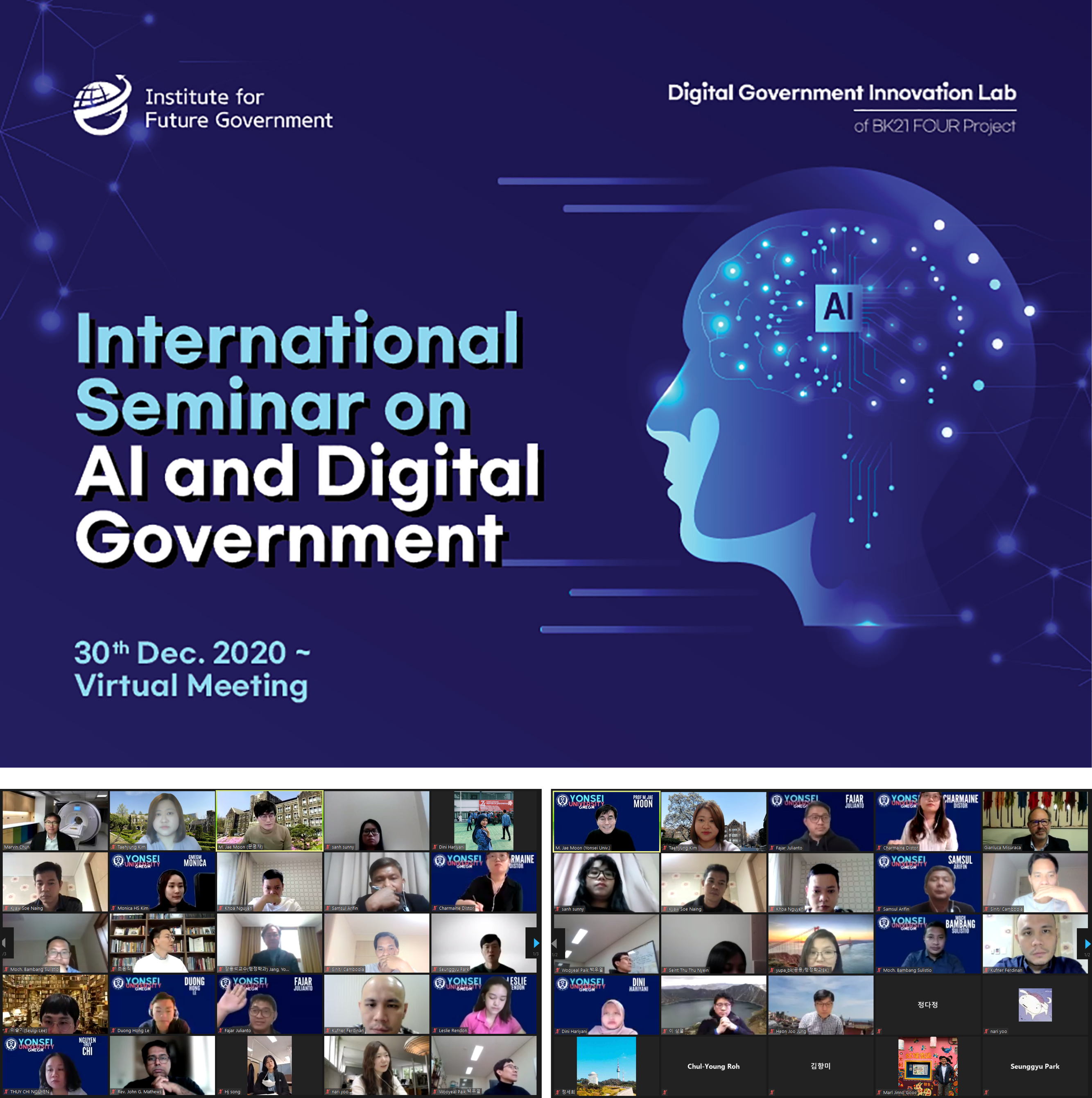
Following the International Seminar on AI and Digital Government in 2021, the Institute is holding a book concert by inviting authors who have written excellent books on future government. It will continue to introduce and discuss the book, starting with Professor Chang Kil Lee of Sejong University on May 10, Professor Jin Park of KDI School of Public Policy and Management on May 24, and Professor Yeon Seob Ha (Senior Vice President of International Campus) from the Department of Public Administration at Yonsei University on May 31.
At a time when the world is experiencing chaos due to the unprecedented COVID-19 pandemic, the Institute held an international webinar on May 21 last year to understand the current status of each country's COVID-19 response strategy and discuss countermeasures together. Scholars from leading universities in South Korea, Italy, Sweden, Israel, Turkey, China, Hong Kong, and Singapore, presented their own country's current situation and countermeasures against COVID-19, highlighting the seriousness of the current issue and the importance of the government's role.
Meanwhile, Professor Yoon Jik Cho (Department of Public Administration) who is a Co-researcher at the Institute commissioned the research agency "R&R" to conduct a second panel survey targeting public officials. This is going beyond the previous survey conducted by the Institute for the general public. It aims to identify competencies that are important for the successful operation of the future government for public officials, and to conduct research in terms of organizational behavior, such as organizational silence and organizational politics, in order to determine competencies that are important for the successful operation of the future government and that influence organizational and work performance.
The Institute for Future Government has published four academic books through joint research with participating graduate students so far. The graduate students who participated in the study selected best practices based on their research on organizational innovation, big data, and business innovation. As a result, they published Future Government Innovation Cases: Utilization of the 4th Industrial Technology and Future Government as an Innovation Case. Quality of Government and Quality of Life, which summarizes the results of joint research between professional researchers and graduate students, and The Trusted Future Government of a Hyper-Changing Society, which uses survey data and thesis contents of the Institute for Future Government, were also published. The latter has been selected as an excellent academic book in 2019 in the academic section of Sejong Books organized by the Korea Publication Industry Promotion Agency.
The Institute is making every effort to spread its research results academically and socially. Conclusions that are drawn based on major research achievements and survey results conducted at the center level are produced and provided in the form of card news. Furthermore, data from the "Statistical Survey on the Quality of Government and Trust in Government (2018)," "2nd Survey of the Future Government Model and the Quality of Government (2019)," "Survey of Public Perceptions on Major Policies for the Future Society (2019)," and the "Politics of Government Reorganization Data Set, 1980-2014" are available on the website. The research results of the Institute are extended to public goods and open to further research by providing data when it is requested through a Google survey.
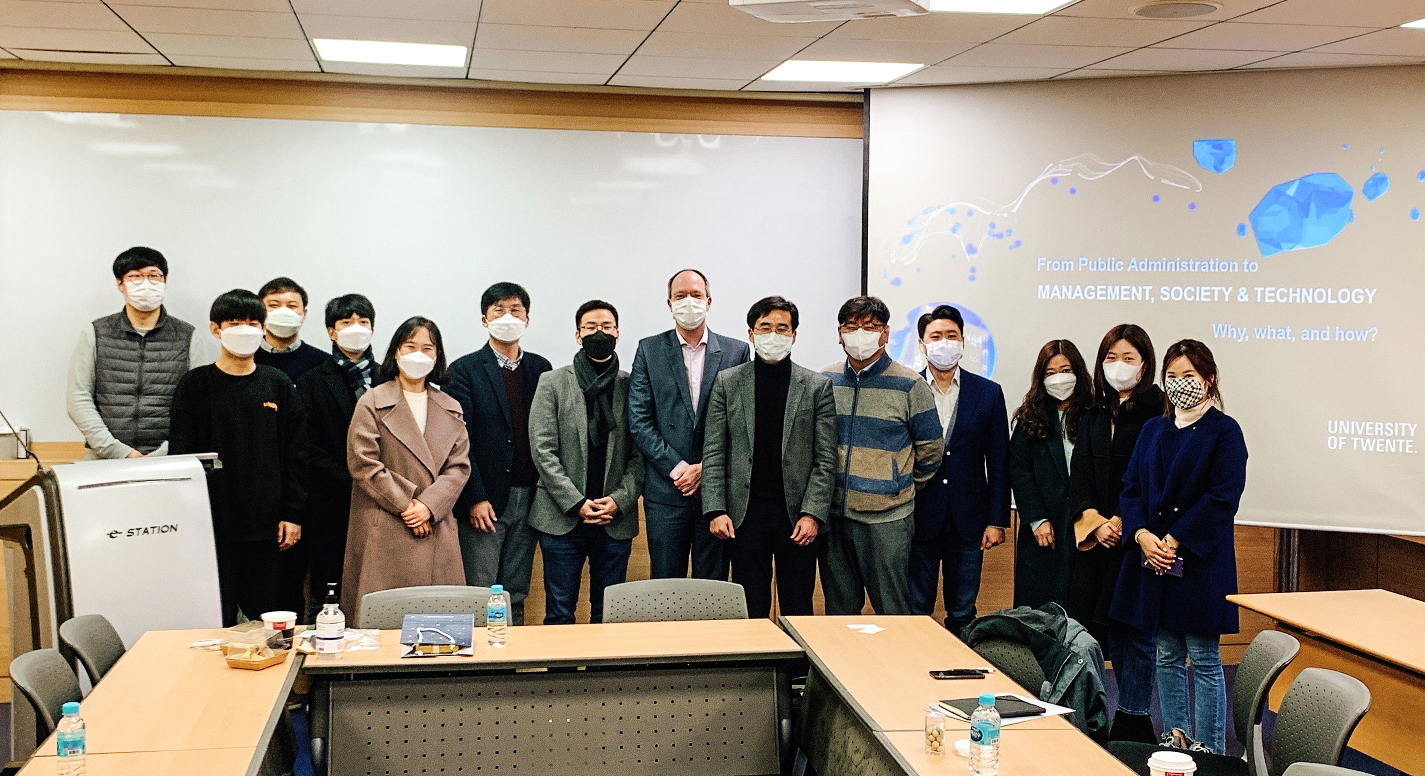
Implementation of Academic Research in Policy
There are many cases in which academic research has been reflected in the policy agenda through active research and policy advisory activities of the Institute to realize the image of the future government and contribute to government policy innovation. "Rapid Future Technological Development and Paradigm Shift in Public Service," conducted as a research project by the National Assembly Futures Institute in 2019, analyzes opportunities and threat factors arising from future scientific and technological development and social change. It also analyzes the future government's organization, personnel, and public services, which is a study related to paradigms of public services.
In 2018, the Public Procurement Service and the Ministry of Strategy and Finance conducted a study on "Measures to Improve the Preliminary Feasibility Survey System for Government R&D Programs" and "Framework and Implementation Strategy of Public Procurement for Technological Innovation in Korea," it has created a legislative record of revising the "National Finance Law," "Guidelines for Preliminary Feasibility Studies," "General Guidelines for Preliminary Feasibility Studies for Government R&D Programs," and contributed to revising the "Enforcement Decree of the National Contract Law." In addition, a method for establishing cooperative governance for the provision of e-government services was presented through a study on the "Establishment of Cooperative Governance for the Joint Use of Integrated Administrative Information and Provision of E-Government Services," which was conducted by the Office for Government Policy Coordination from 2019 to 2020.
With regards to the spread of COVID-19 and important social issues, such as the 21st National Assembly election, the Institute conducted a survey on major issues and big data analysis of civil complaints on e-People. It contributed to the resolution of uncertainty in related information and the settlement of policy elections through various media including terrestrial broadcasting, Internet (YouTube), and newspapers. Furthermore, senior researchers at the Institute, such as Professor M. Jae Moon and Professor T. J. Lah, are providing policy recommendations in various fields, such as the third sector, social innovation, and foreign policy through major media outlets.
Additionally, the Institute for Future Government has contributed to various policies and project planning of the government (77 cases for central government and local governments, 19 cases for public institutions and other government-affiliated agencies) and private institutions (4 cases) based on the research achievements so far. It has served as an advisor to the Ministry of Foreign Affairs, the Ministry of National Defense, the Ministry of Personnel Management, the policy field of the Board of Audit and Inspection, the National Human Resources Development Institute, the personnel field of Cheonan City, the research field of the Korea Institute of Public Administration, as well as the evaluation field of a private institution of the SK Center for Social Value Enhancement Studies (CSES). In addition, the Institute is actively participating in the performance evaluation of the Office for Government Policy Coordination, the Ministry of National Defense, the Ministry of Unification, the Ministry of Culture, Sports and Tourism, the Ministry of Gender Equality and Family, Seodaemun-gu, the Economics, Humanities and Social Research Council, and the Korea Social Enterprise Agency, and the management evaluation of public institutions, local public corporations, and responsible operating organizations, so that the images of the future government can be utilized in the operating directions and strategies of each institution.
Innovation in the private sector, led by companies, is always at the forefront of change, but innovation in the public sector, especially government innovation, has structural limitations that make it difficult to voluntarily and preemptively implement it. However, one can expect a "better Republic of Korea" because there are research institutes such as the Institute for Future Government that contemplate the future government in line with the rapidly changing demands of the times and suggest sustainable development through government innovation.
The future government is not only an object of prediction, but also an outcome to be made. We met Professor M. Jae Moon, Professor Yoon Jik Cho, and former researcher Dr. Tae Hyung Kim, who are leading the Institute to create a "better future government" and a "better world" at the policy and system level to learn about hyper-changing society and future government research.
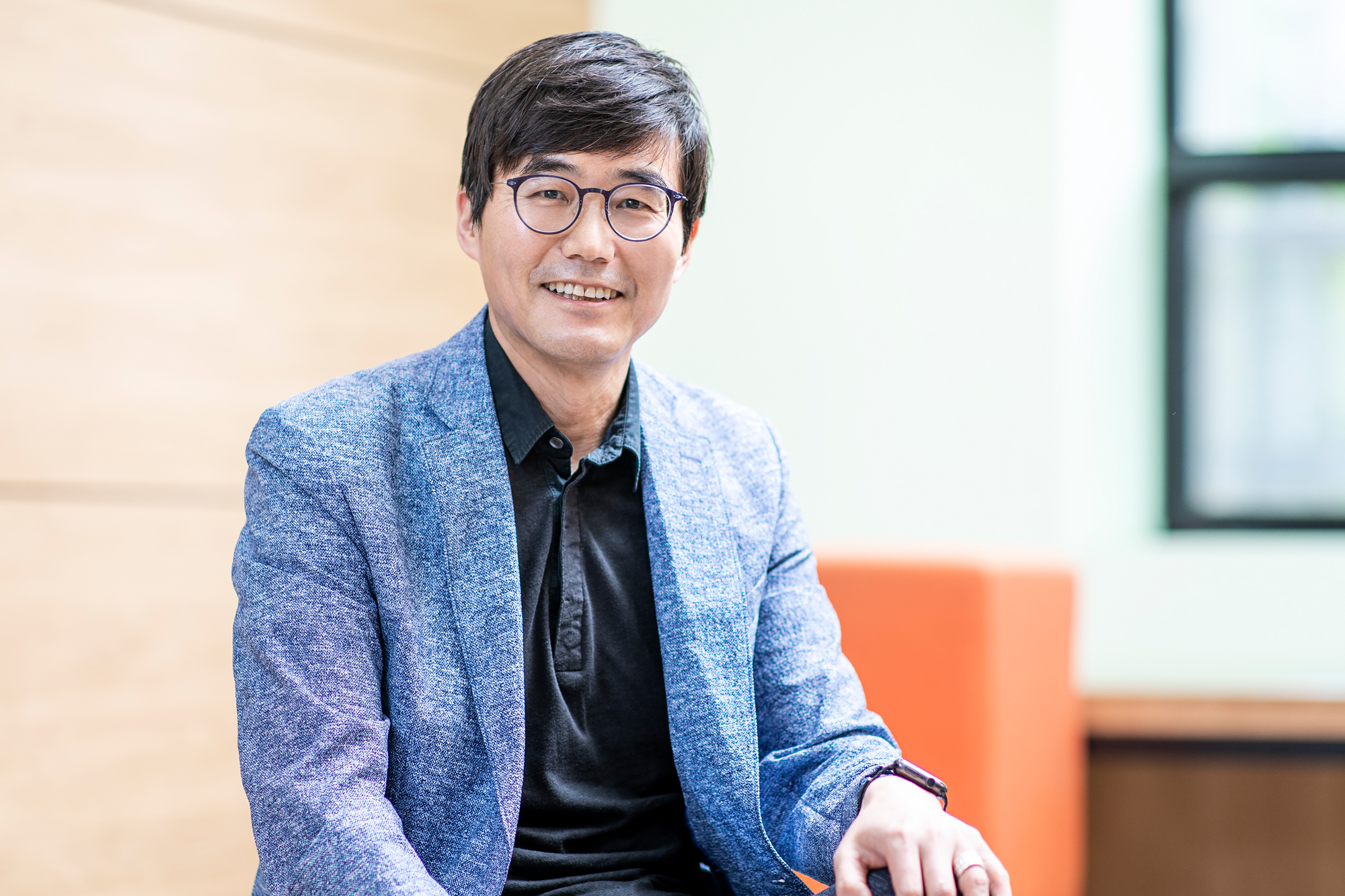
"Future government research is like applying a brush stroke of imagination on the sketch of reality. The hyper-changing era requires strong brushstrokes that go beyond the existing sketches. Strong brushstrokes are deep reflections on citizenship and understanding of disruptive technologies, such as AI technology, and it can be developed by predictions about challenges like COVID-19 or climate change."
Dean M. Jae Moon Dean, College of Social Sciences
Chairman, the Institute for Future Government Project Group;
Professor, Department of Public Administration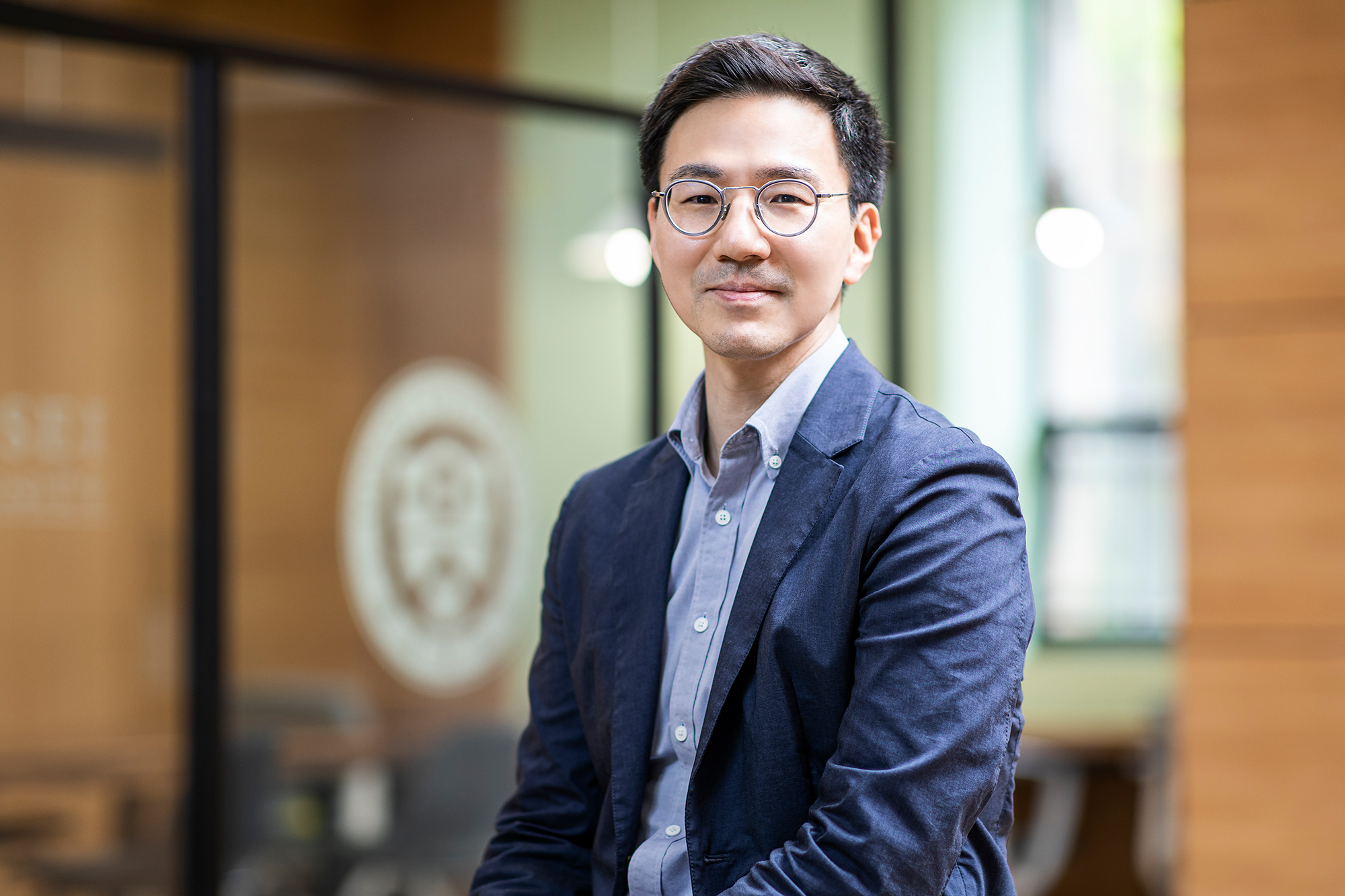
“The current public officials panel survey is being conducted to suggest implications for the improvement in the capabilities, attitudes, and behaviors of public officials for the successful operation of the future government in the context of active administration. We are investigating various organizational characteristics and civil servant behavior, including organizational silence, organizational politics, and intra-organizational communication in order to understand in detail what kind of challenges the rapidly changing modern work environment poses to public officials.”
Yoon Jik Cho
Dean Yoon Jik Cho, Department of Public Administration, College of Social Sciences
Co-Researcher, the Institute for Future Government;
Professor, Department of Public Administration“The government, which is facing various social problems due to environmental uncertainty and social difficulties, is thinking about ways to strengthen its capabilities and exploring policy cases so that it can respond successfully and agilely in the future society. The Institute's goal is to build a research ecosystem that can contribute to society by sharing the data that it collected and drawing out research results through it.”
Research Professor Tae Hyung Kim
Full-time Researcher, the Institute for Future Government;
Doctor of Public Administration
show mobile menu
mobile menu

